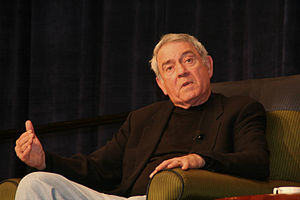Dan Rather: ‘It’s My Job To Give People The Facts’
In the middle of the turmoil after the assassination of the president John F. Kennedy on Nov. 22, 1963, millions sat in front of televisions to watch the announcement of the president’s death. There Dan Rather was in Dallas, Tx., suppressing all of his emotions to focus only on giving every little detail of the assassination to the audience. He was the first to announce the president’s death on television news.
“It was a hammer to the heart to each individual in America,” said Rather, reminiscing during his video conference on C-SPAN on Feb. 24, 2011. With participants from George Mason University, George Washington University, Georgetown University, Purdue University and University of Denver, Rather shared his experience as a journalist and opinions on how the future journalism should evolve with the advancement of technology.
Regarding online journalism, Rather said that the coverage on the assassination in 1963 would have been different these days.
“Taking Egypt as example, social media has been tremendous tool public at large to use against power,” Rather said.
However, he was also concerned of its weaknesses.
“American journalism today needs a spine transplant,” Rather said. He said that ever-emerging new technologies often convey dangers of being manipulated by those in power or authority, and journalists should engage to help audience by verifying information floating around the globe.
He also said that today’s consumers of journalism needs to be more educated in order to “make more sense of our knowledge.”
“The public is now confused and politicians are taking advantage of that,” Rather said.
Rather advised the participating students to become responsible journalists and understand the basic fundamentals of democracy and checks and balances system that the American journalism has grown upon.
“The right attitude of a journalist is to say ‘let’s get the facts right,'” Rather said. “As a professional, you have to seal out all your emotions and focus on the job in your hand.”
Wikileaks as an example, Rather said online sources should be carefully monitored.
“[WikiLeaks] helps public service in many ways, but also risks many lives,” Rather said. He said that today’s journalists should account the duality of online sources, and always focus on verifying any information received.
However, Rather was hopeful that new fundamentals of journalism will solve the challenges that today’s journalists encounter.
“Hopefully a new business model will emerge for online journalism,” Rather said. ” The old business model is dead and shrinking.”



Leave a Comment